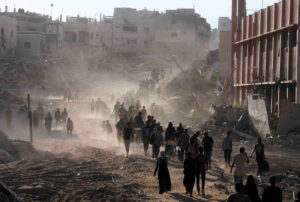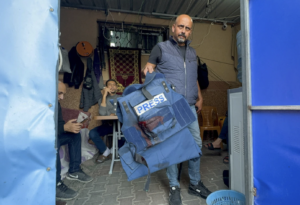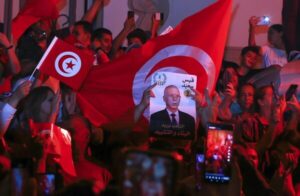
The National Interest Foundation Newsletter
Issue 256, October 11, 2024
Welcome to our NIF Newsletter. In this week’s edition, we provide insight into the effect of October 7th now more than one year after the onset of the Gaza War, examine Israel’s unprecedented killing of journalists during the aforementioned conflict, and analyze the recent rigged election which took place in Tunisia.
Editor: Bassam Tarbush
The Effect of October 7th

During the past year, Israel’s indiscriminate assault on Gaza has decimated the Palestinian territory and killed tens of thousands of innocent civilians. (Photo from Reuters)
The Effect of October 7th
By Daniel Imbornoni
This past Monday marked the one-year milestone since the October 7th, 2023 Hamas attacks. While the attacks were rightly denounced for their killing of innocent civilians, Israel’s disproportionate military offensive that has ensued during the preceding 12 months also warrants strong condemnation. The destructive assault on Gaza has been rife with Israeli war crimes and human rights violations, as it has decimated the enclave, killed tens of thousands of innocent civilians, created a dire humanitarian crisis, and displaced more than 90% of the surviving inhabitants. The perpetuation of the conflict has also fueled additional regional hostilities and escalations that severely risk spiraling the Middle East into all-out war. As has been pointed out by human rights activists, various United Nations officials, and other fair-minded observers, it is important to note that the October 7th attack by Hamas did not happen in a vacuum. The brutal manner in which it was carried out certainly deserves criticism, but one must also not lose sight of the decades of oppressive Israeli occupation, human rights abuses, war crimes, and societal injustices that Palestinians have been subjected to which have stoked this type of animosity and cycle of tit-for-tat violence.
In the preceding year, more than 42,000 Palestinians have been killed since the onset of the Gaza War, an extremely troubling number of which have been women and children. It has been estimated that at least 69% of those killed have been these types of civilians, and humanitarian agencies recently released new data findings which show that more women and children have been killed at the hands of Israeli military forces in Gaza over the past year than the equivalent period of any other conflict in the 21st century. Equally as disturbing, there are still at least 10,000 civilians that are unaccounted for in the rubble, many of whom have been likely killed but yet undiscovered due to the debris and destruction as a result of Israel’s relentless bombardment. A reprehensible 80% of Gaza has been destroyed, with footage from throughout the war demonstrating the leveling of entire cities within the region. These represent only some of the examples of the suffering and mass destruction that the people of Gaza have endured during the course of the past year, with much more being well-documented. Yet, all of this, even in conjunction with growing criticism regarding the manner in which they have waged their military operations, has not stopped Israeli forces from continuing to inflict mass devastation on the besieged territory.
The Gaza War has remained a divisive issue across the United States since the outbreak of the conflict, and has stayed a primary foreign policy issue for many Americans. The country has seen a wide range of debate and activism from various entities, often in the forms of student activism, protests and demonstrations, social movements, and everyday discussion. Throughout the course of the past year, public opinion within the United States has increasingly become more critical of Israel’s military actions. According to data from a recent Pew Research poll, a larger number of Americans now want the U.S. to help diplomatically resolve the conflict. Furthermore, there has been a widening divide in the American Jewish community over support of Israel and its leadership. The war has led many, particularly young Jewish-Americans, to question the United States’ support of the Israeli government and military in light of the latter’s policies and behavior. As such, the notable anti-war movement within the United States has gained a lot of traction since late 2023, with a growing number of citizens expressing concern with unconditional U.S. arms sales to Israel which they legitimately point out have been used to commit grave war crimes and human rights violations.
Since Israel began its military operations in Gaza, officials in the country have been criticized for an absence of achievable objectives and instead seem intent on waging endless war. Their bellicose actions have fostered devastation across Gaza and been harmful to the prospects for regional peace and stability, as hostilities in Lebanon and with Iran are on the brink of flaring into potentially wider-scale conflict that could drag in other actors such as the United States. Additionally, the families of hostages taken during the October 7th Hamas attacks and much of the Israeli public at-large have even expressed skepticism at the Netanyahu government’s tactics going as far back as last December, and this has only grown with the perpetuation of the war and bloodshed. Ultimately, the region is more volatile and turbulent now than it was a year ago, as the world waits on a knife-edge and can only hope that the ongoing Israel-Iran tit-for-tat does not deteriorate into more direct and deadly violence. Israel’s War on Gaza has come at the expense of the lives of tens of thousands of innocent civilians, left the territory in ruins, and made the Middle East less safe.
Israel’s Unprecedented Killing of Journalists in Gaza

Members of the press reporting on the Gaza War have faced danger on an unimaginable scale. (Photo from Reuters)
Israel’s Unprecedented Killing of Journalists in Gaza
By Meg Richards
Freedom of the press is a fundamental tenet that is protected and valued in the United States, leading one to question why U.S. officials have not done more to hold Israel accountable for its unparalleled killing of journalists in Gaza? Monday of this week marked a year of the genocide in Gaza, and further yet, the deadliest year on record of suppression and censorship by means of literally targeting and killing media workers. Given the fact that the United States is founded upon the principles of freedom of speech, press, and assembly, among others, this seems antithetical to what our country espouses and stands for. The targeting of journalists and other media workers – who are civilians – as Israeli forces have systematically done, is an egregious war crime and human rights violation under the accepted standards of international law.
The regrettably challenging task for journalists in Gaza is to focus on survival, as well as coverage and explanations of what is happening before their eyes, most importantly to Western audiences. According to the Committee to Protect Journalists, the ongoing Gaza War is the deadliest conflict in history for journalists and media workers. The overwhelming majority of journalists killed in Gaza have been Palestinian, and the year-long death toll is staggering and unlike any other conflict. The Israeli war crimes committed have only been able to be widely documented thanks to the work of these brave men and women, and the modern usage of social media as a tool for sharing and disseminating information.
Among those that have been killed during the course of the past year are Al Jazeera correspondents Samer Abu Daqqa, Ismail Al-Ghoul, Rami Al-Rifi, and Hamza Al-Dahdouh – the son of Al Jazeera’s Gaza bureau chief Wael Al-Dahdouh. Numerous other members of Wael Al-Dahdouh’s family have also been killed. In a recent Al Jazeera investigative documentary into the scope of Israeli war crimes committed in Gaza, a tribute was made to these and others that have been appallingly murdered at the hands of Israeli forces. Despite the unthinkable danger and risk that they constantly face, admirable work has been done by investigative journalists on the ground in Gaza like Bisan Owda – the brave young woman that has documented her life under siege in the Palestinian territory who has recently won both a Peabody and Emmy award for her journalism. Owda has nobly and courageously documented her first-hand experiences in Gaza in the name of drawing attention via social media, and in doing so, helped to broadcast Israel’s war crimes and human rights abuses for all to see. Without this evidence and exposure, the struggle for accountability and justice would be an even more daunting task. Yet, the war crimes continue to take place while denial still festers as well.
The sheer volume of overwhelming and undeniable evidence of war crimes that we have borne witness to over the last year can be singularly credited to the bravery of the journalists in Gaza. This is not due to just the professional reporters and writers, but also civilians who have used their phones to record what has been taking place. Ironically, this is how we know that Israel has been targeting media workers, as well as humanitarian aid workers, medical workers, and the civilian population of non-combatants at-large. The documentation of the Israeli armed forces’ actions highlights a clear and repeated pattern, and debunks any claims that these incidents are coincidental, accidental, and most importantly, isolated or rare. Furthermore, Israel is attempting to control the narrative by targeting media workers – even outside of Gaza – and closing news outlet offices, while also instilling fear in journalists that their homes, families, and livelihoods will be targeted for simply reporting the truth. The intent is plain to see, that this is censorship aimed at blatantly covering up what is transpiring, suppressing the documentation of war crimes, and hindering the distribution of this information to the outside world.
Reporters have been killed, displaced, arrested, tortured, and exiled for merely seeking to do their jobs. As Al Jazeera reporter Mohammed R. Mhawish put it: “When the press is silenced, it’s not just a building that closes or stories that disappear. It’s accountability itself that is lost. It cuts off a vital flow of information to the public…and the consequences ripple far beyond the journalists themselves. The world loses access to the ground truth – the kind of truth that challenges “official” government narratives, the kind that holds the powerful to account.” There has never been true accountability for Israel’s targeting and killing of journalists, something that unfortunately is not some new phenomenon, and did not begin this past year in Gaza. If this behavior continues to go unchecked, tragic killings like these will sadly persist.
Rigged Election in Tunisia

Pro-democracy advocates have highlighted how the outcome of the election was engineered by the Saied regime. (Photo from AP)
Rigged Election in Tunisia
By Jake Spiller
Situated in the heart of North Africa, Tunisia was the birthplace of the Arab Spring back in late 2010. It became a country filled with the hopes and promises of democracy after the Tunisian people ousted former President Ben Ali’s authoritarian regime. Dishearteningly, now fourteen years later, current President Kais Saied has seemingly secured his grip on the country for the foreseeable future in a rigged election that was manufactured by his regime. Observers and experts have noted that Saied ensured his “victory” long before election day, as political party leaders and candidates were disqualified from running and even imprisoned. The purported results from the government-controlled Independent High Authority for Elections (ISIE) contend that in the recent October 6th election, Saied won with 90.69% of the vote, with a low turnout of only 28.8%.
On election day, voters had three options on the ballot for president: Kais Saied himself; Zouhair Maghzaoui, who continues to voice his support for the president’s self-coup against parliament; and Ayachi Zammel, who was not well known before the election. Back on September 2nd, Zammel was arrested in a move denounced by human rights groups and opposition leaders as another attempt to ensure that Saied faces no competition. Still, Zammel, imprisoned during the campaign’s final month, garnered 7.35% of the vote. Saied’s efforts to consolidate power in Tunisia began in July of 2021, when he suspended the elected parliament and held a constitutional referendum the next year seeking to transform the young democracy. The new constitution centralized power in the hands of the president, and weakened parliament’s power. Saied tried to sell the move as necessary in order to end the parliament’s ineffectiveness and corruption, but pro-democracy advocates pointed out how it was clearly aimed at solidifying his grip on power and weakening the checks and balances system in the country. Saied initiated more undemocratic actions during the lead-up to the recent presidential election, as he had potential candidates disqualified or arrested for trumped up charges such as allegedly violating state security, forging signatures, and sharing fake news. These and other actions by Saied have left no one with the political power to stop him, as he also had the once-independent ISIE taken over and replaced with loyal “yes men,” while the courts were stripped of oversight over the election.
Unfortunately, those hoping for a strong foreign condemnation from the United States or European Union (EU) will likely be disappointed, as neither has taken any real action or released an official statement. The only word out of the latter is from the EU Spokesperson for Foreign Affairs and Security Policy, who said that the EU “takes note of the position expressed by many Tunisian social and political actors regarding the integrity of the electoral process.” No action from the EU has been promised. This starkly contrasts with the Venezuelan presidential election held only this past July, which saw denouncement and demands for the results to be released from multiple nations and international organizations. While Venezuela did have a deal with the U.S. to ease sanctions on its oil if it held a free and fair election, a significant difference between the Tunisian and Venezuelan elections was turnout. In Venezuela, turnout was around 60%, double that seen in Tunisia. Additionally, in Venezuela, the opposition had united behind a single candidate, whereas in Tunisia, there were competing strategies on how to handle the election: one camp had encouraged a full-on boycott of the election, while a second camp had called for mass participation in order to overwhelm the Saied regime’s attempts to manipulate the outcome of the election. The high turnout and strong opposition candidate in Venezuela appear to have forced incumbent leader Nicolás Maduro to seriously rig the results. In Tunisia, the decision by much of the opposition to boycott the election looks to have paved the way for Saied to avoid needing to interfere with the ballots themselves. The result strongly implies that Saied’s supporters turned out to vote, while his opposition was divided, with a significant number of citizens sitting out the election.
Meanwhile, U.S. officials, preoccupied with wars in Ukraine and Gaza, and seeking to prevent the outbreak of wider-scale conflict in the Middle East, have not dedicated much foreign policy focus on what is transpiring in Tunisia. The U.S. government likely does not have the will or political bandwidth for serious engagement regarding Tunisia, especially since there is no clear opposition leader to back and no immediate risk for any conflict or instability to spread – unlike what is taking place between Israel and Iran. One U.S. Senator, Chris Murphy (D-CT), did release a statement in which he called out President Saied for systematically dismantling Tunisia’s democracy, thus robbing the Tunisian people of their ability to voice their opposition to his autocracy. Senator Murphy called on the United States to continue its “support of the Tunisian people, civil society, and independent media.”
Another factor affecting foreign reactions is Tunisia’s strategic location. It is the northernmost African country, located on the Mediterranean just south of Italy and has therefore become a popular route for migrants from Sub-Saharan Africa to get into Europe. This led to Italian Prime Minister Giorgia Meloni making four visits to Tunisia in 2024, with controlling migration a top priority. Meloni and Saied have signed agreements between Tunisia and Italy, giving economic aid in exchange for cooperation on regulating migration, as officials seem to be focused on preventing irregular crossings and allowing an increasing number of Tunisians to work legally in Italy. Many across Europe, which continues to see a surge in far-right and anti-immigration parties, are most interested in a stable government in Tunisia. Thus, European leaders might fear that speaking out against Saied would jeopardize coordination on these aforementioned initiatives.
Saied’s “electoral triumph” theoretically gives him five years until the next election in 2029. What would potentially happen then is unknown, as the modified 2022 Tunisian constitution does include the president being limited to two terms but it removed the provision from the 2014 constitution which stated that it may not be amended to increase the number of terms. In light of Saied’s actions over the past several years since the July 2021 coup, it is clear that no strong checks and balances exist within the system that Saied has manipulated to benefit him. If Saied calls for a referendum to be allowed to run for additional terms, not much appears to stand in his way. However, as noted by various outlets, the recent election results are similar to the last election before the Tunisian revolution which ousted Ben Ali. As such, the fate of Tunisian democracy could again fall into the hands of the people at-large, who might need to be willing to stand up for it in the face of Saied’s repression.
Enter the text or HTML code here
